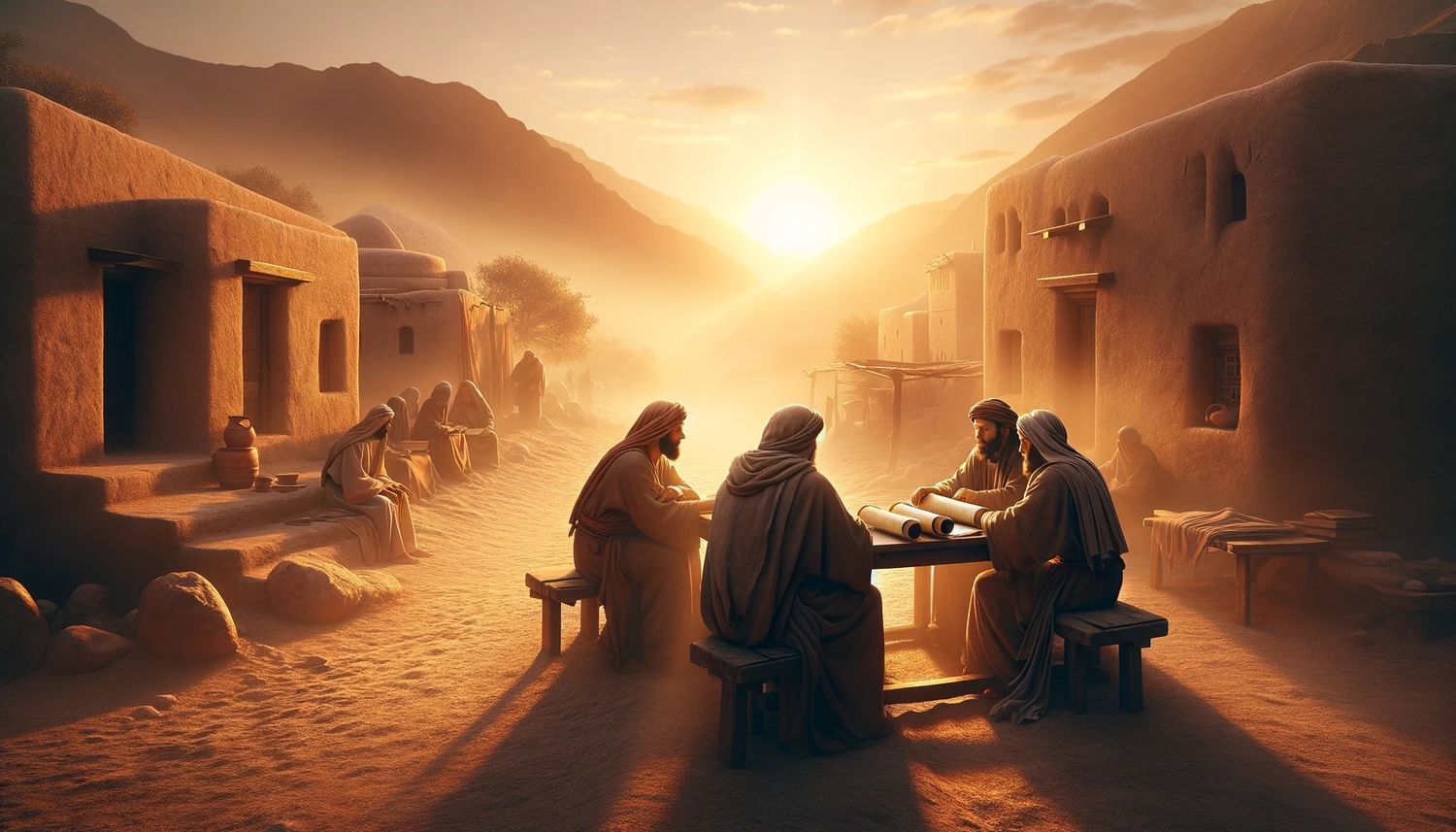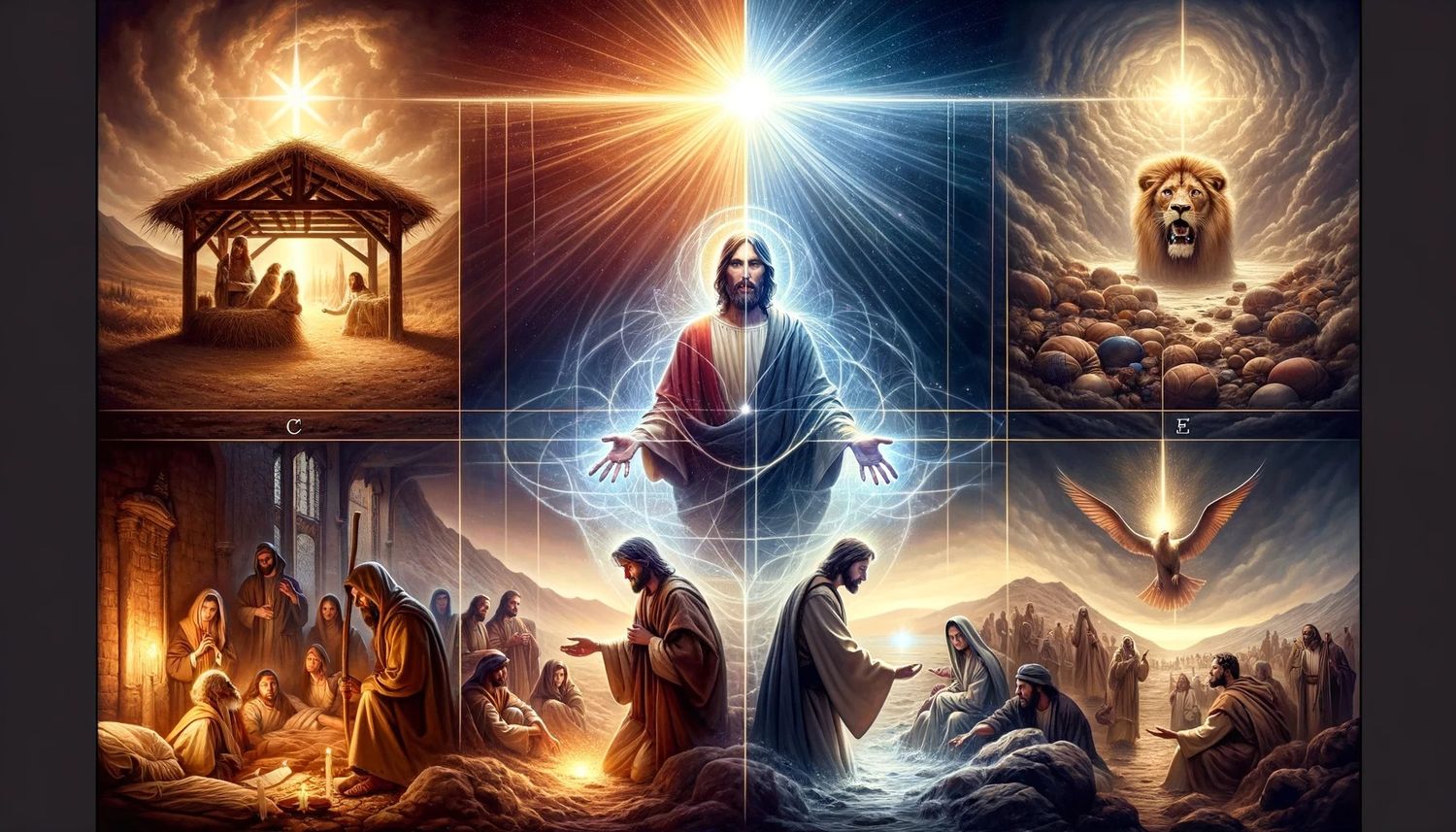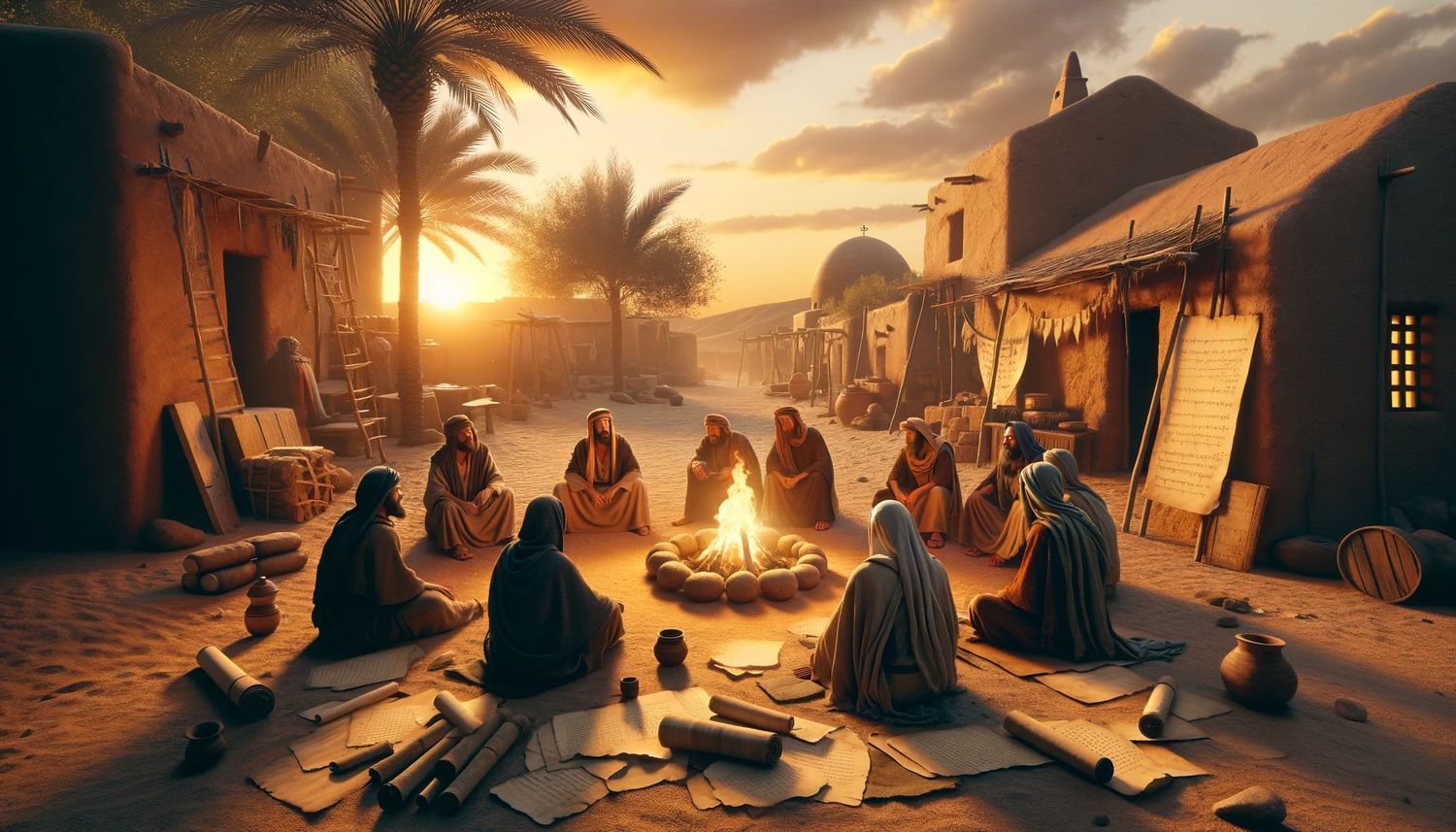Home>Christian Videos>Bible Stories>How Do The Synoptic Gospels View The Kingdom Of God?


Bible Stories
How Do The Synoptic Gospels View The Kingdom Of God?
Published: March 6, 2024
Peter Smith, Editorial Director at Christian.net, combines deep insights into faith, politics, and culture to lead content creation that resonates widely. Awarded for his contributions to religious discourse, he previously headed a major organization for religious communicators, enhancing dialogue on faith's societal impacts.
Explore the perspectives of the Synoptic Gospels on the Kingdom of God in this insightful analysis of biblical stories. Delve into the rich narratives and gain a deeper understanding of their teachings.
(Many of the links in this article redirect to a specific reviewed product. Your purchase of these products through affiliate links helps to generate commission for Christian.net, at no extra cost. Learn more)
Table of Contents
Introduction
How do the Synoptic Gospels view the Kingdom of God? This question has been a subject of scholarly debate and theological reflection for centuries. The Synoptic Gospels, namely Matthew, Mark, and Luke, offer distinct perspectives on the Kingdom of God, reflecting the diverse theological emphases and audiences of the early Christian communities. Understanding these perspectives is crucial for gaining insight into the foundational beliefs of Christianity and the teachings of Jesus Christ. In this article, we will explore and compare the depictions of the Kingdom of God in the Synoptic Gospels, shedding light on the nuances and commonalities within these essential Christian texts.
The Kingdom of God in the Gospel of Matthew
-
Emphasis on Fulfillment of Prophecy: The Gospel of Matthew presents the Kingdom of God as the fulfillment of Old Testament prophecies. It highlights Jesus as the long-awaited Messiah who inaugurates the Kingdom, fulfilling the promises made to the people of Israel. This emphasis on fulfillment underscores the continuity between the Old Testament and the arrival of the Kingdom of God in Jesus Christ.
-
Ethical and Moral Standards: Matthew's Gospel emphasizes the ethical and moral standards of the Kingdom of God. It contains the renowned Sermon on the Mount, where Jesus articulates the ethical principles of the Kingdom, including the Beatitudes and teachings on love, forgiveness, and righteousness. These teachings serve as a guide for the ethical conduct of the followers of Jesus within the Kingdom of God.
-
Authority and Kingship of Jesus: In Matthew, the Kingdom of God is closely linked to the authority and kingship of Jesus. He is portrayed as the divine King who exercises authority over the Kingdom, and his teachings and actions demonstrate the nature of his kingship. The parables in Matthew further illustrate the authority of Jesus as the one who reveals the mysteries of the Kingdom to his disciples.
-
Inclusivity and Universality: While Matthew's Gospel emphasizes the Jewish context of Jesus' ministry, it also portrays the Kingdom of God as inclusive and universal. The Great Commission at the end of the Gospel underscores the universal scope of the Kingdom, as Jesus sends his disciples to make disciples of all nations, extending the invitation to participate in the Kingdom to people beyond the Jewish community.
-
Eschatological Dimension: The Gospel of Matthew also presents the Kingdom of God with a strong eschatological dimension. It addresses the future consummation of the Kingdom, depicting the final judgment and the ultimate establishment of God's reign. The parables of the Kingdom in Matthew highlight the tension between the present reality of the Kingdom and its future fulfillment, urging the audience to be prepared for the coming eschatological reality.
Understanding the portrayal of the Kingdom of God in the Gospel of Matthew provides valuable insights into the theological themes and perspectives that shaped the early Christian community and continue to influence Christian beliefs and practices today.
The Kingdom of God in the Gospel of Mark
-
Immediacy and Power: The Gospel of Mark portrays the Kingdom of God with a sense of immediacy and power. Mark emphasizes the urgency of the Kingdom's arrival through Jesus' ministry. The opening proclamation of Jesus, "The time is fulfilled, and the kingdom of God is at hand; repent and believe in the gospel," underscores the imminent nature of the Kingdom's manifestation. The miraculous deeds of Jesus, such as healing the sick, casting out demons, and calming the storm, serve as demonstrations of the Kingdom's power breaking into the present reality.
-
Conflict and Opposition: Mark's Gospel also highlights the conflict and opposition faced by Jesus in the context of proclaiming the Kingdom of God. The parables and teachings in Mark illustrate the resistance encountered by Jesus, particularly from religious authorities and those entrenched in worldly power structures. This emphasis on conflict underscores the radical nature of the Kingdom and the opposition it provokes within the existing social and religious order.
-
Servanthood and Suffering: In Mark, the Kingdom of God is intimately connected to the servanthood and suffering of Jesus. The portrayal of Jesus as the suffering servant underscores the paradoxical nature of the Kingdom, where power is manifested through humility and self-sacrifice. The climactic moments of Jesus' crucifixion and the subsequent resurrection serve as pivotal events that reveal the redemptive and transformative power of the Kingdom amidst suffering and death.
-
Inclusivity and Transformation: While Mark's Gospel emphasizes the Kingdom's challenge to existing structures, it also conveys the inclusive and transformative nature of the Kingdom of God. The acts of compassion and inclusion demonstrated by Jesus, particularly towards the marginalized and outcasts, exemplify the Kingdom's transformative impact on individuals and communities. The healing of the demon-possessed man in the region of the Gerasenes and the encounter with the Syrophoenician woman exemplify the universal reach of the Kingdom's transformative power.
-
Eschatological Fulfillment: Mark presents the Kingdom of God with an eschatological dimension, pointing towards its ultimate fulfillment in the future. The apocalyptic discourse in Mark 13 and the parables of the Kingdom convey the tension between the present reality of the Kingdom and its future consummation. The call to watchfulness and readiness for the coming of the Son of Man underscores the eschatological hope and anticipation associated with the Kingdom of God.
Understanding the depiction of the Kingdom of God in the Gospel of Mark provides valuable insights into the dynamic and multifaceted nature of the Kingdom as presented in the Synoptic Gospels.
The Kingdom of God in the Gospel of Luke
-
Emphasis on Social Justice and Reversal of Fortunes: The Gospel of Luke presents the Kingdom of God with a distinct emphasis on social justice and the reversal of fortunes. Luke's portrayal of Jesus' ministry highlights his concern for the marginalized and oppressed, emphasizing the transformative impact of the Kingdom on societal structures. The Beatitudes in Luke, often referred to as the "Sermon on the Plain," underscore the reversal of fortunes within the Kingdom, where the poor are blessed, the hungry are filled, and the oppressed find liberation.
-
Inclusivity and Universality: Luke's Gospel emphasizes the inclusive and universal nature of the Kingdom of God. It portrays Jesus' interactions with individuals from diverse social, cultural, and religious backgrounds, emphasizing the universal reach of the Kingdom's message. The parables in Luke, such as the Good Samaritan and the Prodigal Son, highlight the inclusive nature of the Kingdom, where barriers of ethnicity, social status, and religious identity are transcended.
-
Healing and Restoration: The Kingdom of God in Luke is intimately connected to the themes of healing and restoration. The emphasis on Jesus' ministry of healing the sick, restoring sight to the blind, and proclaiming release to the captives underscores the transformative and restorative power of the Kingdom. The healing miracles in Luke's Gospel serve as tangible demonstrations of the Kingdom's redemptive impact on individuals and communities.
-
Hospitality and Table Fellowship: Luke's portrayal of the Kingdom of God emphasizes the theme of hospitality and table fellowship. Jesus' practice of sharing meals with a diverse range of people reflects the inclusive and welcoming nature of the Kingdom. The imagery of the banquet in the parable of the Great Feast illustrates the expansive and inclusive invitation extended to all to participate in the Kingdom's celebration.
-
Eschatological Hope and Fulfillment: The Gospel of Luke presents the Kingdom of God with a strong eschatological dimension, pointing towards the future fulfillment of God's reign. The teachings of Jesus regarding the coming of the Son of Man and the establishment of God's Kingdom convey a sense of eschatological hope and anticipation. The parables and teachings related to watchfulness and readiness underscore the future-oriented nature of the Kingdom's ultimate consummation.
Understanding the portrayal of the Kingdom of God in the Gospel of Luke provides valuable insights into the themes of social justice, inclusivity, restoration, and eschatological hope that characterize the Kingdom as depicted in the Synoptic Gospels.
A Comparative Analysis of the Synoptic Gospels' Views on the Kingdom of God
The Synoptic Gospels, while sharing commonalities in their portrayal of the Kingdom of God, also exhibit distinct emphases and theological nuances that reflect the diverse perspectives of the early Christian communities. A comparative analysis of the Synoptic Gospels' views on the Kingdom of God reveals the multifaceted nature of this central theme in Christian theology.
Common Themes
Imminence and Presence
All three Gospels convey the imminence and presence of the Kingdom of God through the ministry of Jesus. Whether through the proclamation of the Kingdom's arrival, the demonstration of its power through miracles, or the ethical teachings that embody its principles, Matthew, Mark, and Luke all emphasize the immediate reality of God's reign breaking into human history.
Ethical and Moral Standards
The ethical and moral standards of the Kingdom of God are a prominent theme across the Synoptic Gospels. Each Gospel presents Jesus as a teacher who articulates the ethical principles and values that characterize life within the Kingdom. Whether it is the Sermon on the Mount in Matthew, the emphasis on servanthood and humility in Mark, or the concern for social justice and inclusivity in Luke, the ethical dimension of the Kingdom is central to all three accounts.
Eschatological Hope
Another common thread is the eschatological dimension of the Kingdom of God. The Synoptic Gospels all point towards the future consummation of God's reign, depicting the ultimate fulfillment of the Kingdom in the divine plan for the restoration and renewal of all things. The tension between the present reality of the Kingdom and its future eschatological fulfillment is a recurring theme in the teachings and parables of Jesus across Matthew, Mark, and Luke.
Distinct Emphases
Jewish Context and Fulfillment of Prophecy (Matthew)
Matthew's Gospel emphasizes the Jewish context of Jesus' ministry and presents the Kingdom of God as the fulfillment of Old Testament prophecies. The genealogy of Jesus, the references to Hebrew scriptures, and the portrayal of Jesus as the promised Messiah highlight the continuity between the Old Testament promises and their fulfillment in the person of Jesus Christ.
Immediacy and Power (Mark)
Mark's Gospel emphasizes the immediate and powerful manifestation of the Kingdom of God through the ministry of Jesus. The urgency of Jesus' proclamation, the vivid demonstrations of the Kingdom's power in miracles, and the confrontations with opposing forces underscore the dynamic and forceful arrival of God's reign in the present moment.
Social Justice and Inclusivity (Luke)
Luke's Gospel stands out for its emphasis on social justice, inclusivity, and the reversal of fortunes within the Kingdom of God. The concern for the marginalized, the inclusive outreach to diverse groups, and the portrayal of Jesus as a champion of the oppressed highlight the transformative and inclusive nature of the Kingdom's impact on society.
Comparative Insights
A comparative analysis of the Synoptic Gospels' views on the Kingdom of God reveals a rich tapestry of theological themes and emphases. While each Gospel presents a unique perspective, the collective portrayal of the Kingdom offers a comprehensive understanding of its imminence, ethical standards, eschatological hope, and transformative power. The diversity within the unity of the Synoptic Gospels' depiction of the Kingdom of God enriches the theological landscape of Christian faith and invites deeper exploration and contemplation of its profound implications for believers.
Conclusion
In conclusion, the Synoptic Gospels, namely Matthew, Mark, and Luke, offer rich and diverse perspectives on the Kingdom of God. Each Gospel presents unique emphases and theological nuances, reflecting the distinct concerns and audiences of the early Christian communities. The Kingdom of God is depicted as an imminent, transformative, and eschatological reality, embodying ethical and moral standards, social justice, inclusivity, and the reversal of fortunes. The collective portrayal of the Kingdom in the Synoptic Gospels provides a multifaceted understanding of this central theme in Christian theology, enriching the spiritual and intellectual exploration of its significance for believers. The nuanced depictions of the Kingdom of God in the Synoptic Gospels invite readers to engage with the profound implications of God's reign in human history and to discern its relevance for contemporary faith and practice.














